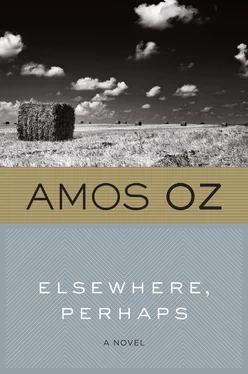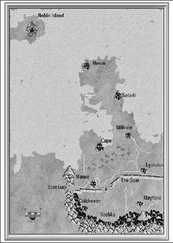Amos Oz - Elsewhere, Perhaps
Здесь есть возможность читать онлайн «Amos Oz - Elsewhere, Perhaps» весь текст электронной книги совершенно бесплатно (целиком полную версию без сокращений). В некоторых случаях можно слушать аудио, скачать через торрент в формате fb2 и присутствует краткое содержание. Год выпуска: 1985, Издательство: Mariner Books, Жанр: Современная проза, на английском языке. Описание произведения, (предисловие) а так же отзывы посетителей доступны на портале библиотеки ЛибКат.
- Название:Elsewhere, Perhaps
- Автор:
- Издательство:Mariner Books
- Жанр:
- Год:1985
- ISBN:нет данных
- Рейтинг книги:4 / 5. Голосов: 1
-
Избранное:Добавить в избранное
- Отзывы:
-
Ваша оценка:
- 80
- 1
- 2
- 3
- 4
- 5
Elsewhere, Perhaps: краткое содержание, описание и аннотация
Предлагаем к чтению аннотацию, описание, краткое содержание или предисловие (зависит от того, что написал сам автор книги «Elsewhere, Perhaps»). Если вы не нашли необходимую информацию о книге — напишите в комментариях, мы постараемся отыскать её.
Elsewhere, Perhaps — читать онлайн бесплатно полную книгу (весь текст) целиком
Ниже представлен текст книги, разбитый по страницам. Система сохранения места последней прочитанной страницы, позволяет с удобством читать онлайн бесплатно книгу «Elsewhere, Perhaps», без необходимости каждый раз заново искать на чём Вы остановились. Поставьте закладку, и сможете в любой момент перейти на страницу, на которой закончили чтение.
Интервал:
Закладка:
The three brothers have thus followed diverging paths. They have moved away from each other and from their origins. All three, however, have experienced hardships and sufferings. Those who believe in an ultimate justice hold that even suffering is a sign of divine Providence, since without suffering there is no happiness and without hardships there is no redemption or joy. We, on the other hand, who yearn for a reformed world, do not believe in this kind of justice. Our aim is to eradicate suffering from the world and to fill it instead with love and brotherhood.
3. STELLA MARIS
Reuven Harish does not chase after barren fireworks. Only action can bring warmth to a heart touched by icy fingers.
He wakes at six o'clock in the morning, gets washed and dressed, picks up his brief case, and walks over to the dining hall. Many of our members begin the day with a sour and sleepy look. Reuven starts his day with a smile. As he slices a tomato or chops a radish for his breakfast, he makes light conversation. His tone is cheerful. See him telling Nina Goldring about the organization of a regional orchestra, discussing the price of grapes with Yitzhak Friedrich, the treasurer, or arranging with Fruma Rominov the earliest possible evening for the next meeting of the education committee. On Monday Mendel Morag will be away; he is going to Haifa to take delivery of a consignment of timber for the carpentry shop. He is sure to stay the night there with his sister. What about Thursday? Mundek Zohar won't object. Thursday, then. How is Tsitron, by the way? I know they're going to visit him in hospital at lunchtime, and I very much wanted to go, but there was a phone call last night telling us to expect a party of Scandinavian tourists then. Hey, Grisha, the barber's coming today or tomorrow. Or have you decided to let your hair grow long, like a beatnik? I can't stand soft tomatoes. Grisha, would you have a look on the table behind you — is there a good firm one there?
At half past seven he goes to the school and waits for the bell to ring. Today I'm going to give you your exercise books back. Some of your essays were a pleasure to read. Some of you, on the other hand, still don't know where to put a comma. That is intolerable in the full sense of the word.
Now let's try to find the central idea in Shimoni's Memorial. What is the poet trying to say? Self-sacrifice, yes. But what is self-sacrifice? That's the question.
At twelve o'clock school is over. A hasty lunch. The tourists are due at half past one. My name is Reuven. Reuven Harish. Welcome to Kibbutz Metsudat Ram. Well now, we can talk quite freely.
At a quarter past two the tourists leave. There would have been nothing exceptional about this group if it had not been for the strange remark of the old Dutch colonel. When that goy had the nerve to say — stressing his great military experience — that the mountain was about to fall on top of us and crush us, I couldn't think of an answer. A phrase that would stick in his mind, for him to hand on to his children and grandchildren. What ridiculous arrogance. "As an expert." I know what I should have said: The mountain will not fall on top of us, because your expertise is only valid elsewhere. Here we observe a different law of gravity. As for death, of course it is true that we all die eventually, but some people are dead even while they are alive. A slight difference, but a decisive one.
What a pity that Reuven Harish is not good at giving instant ripostes, that he needs time to think of a clever answer. To his credit it must be admitted that he is industrious. Having seen the tourists off, he goes home to his empty room, gets undressed, has a refreshing shower, puts on clean clothes and settles down to his marking. There is nothing casual about his work. The red pencil deals ruthlessly with the children's scripts, pouncing on spelling mistakes, filling the margins with comments, firmly but carefully expressed, to avoid discouraging their young minds. Reuven does not consider himself above arguing seriously with his pupils' views. Just because they are only ten or eleven years old, it is wrong to crush them with dogmatic, authoritarian statements. Mistakes, Reuven is in the habit of saying, are not a monopoly of grown-ups. His pencil never draws a red line without specific grounds. That is why his work is not mechanical.
His mind is alert, as always. His sharp green eyes are equally alert. Here is an absorbing subject, for instance: the difference between the work of the children of the members born in Germany and that of the little Russians. It could provide the material for a subtle study. The former express themselves in carefully balanced phrases. Their writing is neat and tidy. The latter let their imaginations run riot. The former frequently suffer from dryness. The latter — from absolute chaos.
Of course these are gross generalizations. We must not rush to deduce from them such dubious notions as a "Russian soul," an expression of which Herzl Goldring, who is responsible for the upkeep of our plants and gardens, is fond. No. After all, both groups were born here. Little children are not presented to one to work on like potter's clay. A true artist perceives the form hidden in the block of stone; he does not force his material, but releases the hidden form. Education is not alchemy. It is a subtle form of chemistry. Not creation from nothing, but creation from something. If you don't take heredity into account, you are beating your head against a brick wall. But it is even worse to make heredity the be-all and end-all. That line is bound to end in nihilism. That Dutch officer wanted to know if I don't long for adventure. What greater adventure could there be than education? Even just a father, a man with children. But he said he didn't have any children. That is why he spoke like that about death. A barren tree!
These thoughts supply the rough draft of what he will say to Bronka tonight.
Between two-thirty and three o'clock Ezra Berger prepares his truck for a long journey. Twice a day, at six in the morning and three in the afternoon, he leaves for Tel Aviv with a ten-ton load of boxes of grapes. We are now at the beginning of the harvesting of the early grapes. Since the beginning of the grape harvest, Ezra has taken on a double job, which occupies him from six in the morning to nearly midnight.
Everywhere else, if a man works a double shift, it is because he is short of money. With us, of course, it is different. Why has Ezra Berger decided to take on the work of two drivers? The question has no answer in material terms. If we believe the gossip — our collaborator in this story — Ezra's excessive industry is due to the relations between his wife and the poet and teacher Reuven Harish. This explanation, which we heard from Fruma Rominov, is undoubtedly sound; only its formulation is, naturally, a little oversimplified.
Anyway, Ezra Berger's powerful body can easily cope with the extra effort. It is a thick-set body, hirsute, and somewhat pot-bellied, with thick, heavy limbs. His muscular shoulders support without the intervention of a neck a dark head with thinning hair. A coarse-featured, solid face, half hidden by a gray cap, the other half staring out at the world with a blank expression. His appearance neither attracts nor repels. What is remarkable is the thick gold ring he wears on the little finger of his left hand. This kind of ornament is commonly worn by truck drivers, but it does not become, in our opinion, a driver who is a member of a kibbutz.
Ezra Berger does not belong to the intellectual circle in our kibbutz. His place is among modest, straightforward men of action. Do not jump to the hasty conclusion that the kibbutz is neatly divided into two categories. No. Ezra Berger himself would refute such a rash idea. He is not young any more (his younger son is already taller than he is), but he still clings to the world of ideas. True, he is not a great reader, nor is he well up in the classical writings of the kibbutz movement. Nevertheless, he is fond of the Bible, and on Saturday, his free day, he reads the Bible. And he reads all the articles of his brother, the scholar. We must not be quick to judge him if he is not one of our regular debaters. His views, which were formed in his early youth, are clear, well defined, and easygoing. This, too, is part of his integrity, which is secretly envied by several of those who outwardly mock it.
Читать дальшеИнтервал:
Закладка:
Похожие книги на «Elsewhere, Perhaps»
Представляем Вашему вниманию похожие книги на «Elsewhere, Perhaps» списком для выбора. Мы отобрали схожую по названию и смыслу литературу в надежде предоставить читателям больше вариантов отыскать новые, интересные, ещё непрочитанные произведения.
Обсуждение, отзывы о книге «Elsewhere, Perhaps» и просто собственные мнения читателей. Оставьте ваши комментарии, напишите, что Вы думаете о произведении, его смысле или главных героях. Укажите что конкретно понравилось, а что нет, и почему Вы так считаете.












